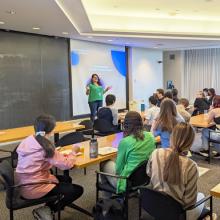Psychological and neural mechanisms of motor learning, memory, and control
From becoming a tennis pro to mastering a musical instrument, the human brain has given us powerful tools to support motor learning. The ACT Lab investigates the psychological and neural principles of motor behavior using behavioral experiments and computational modeling; a primary interest is how neural systems supporting higher-level cognition intertwine with the lower-level control of movements, the so-called "cognitive-motor interface." The lab focuses on the following questions: 1) How do skills evolve from being cognitively demanding to automatic? 2) How does abstract thought facilitate motor learning? 3) Which aspects of motor skill rely on explicit versus implicit memory? Uncovering the fundamental neural and computational principles of motor skill learning will broaden our understanding of complex human mental functions, inspire new animal and machine learning computational frameworks, and inform novel clinical approaches.
Methods
Topics
Biography
Samuel McDougle earned his BA in Neuroscience and Behavior from Vassar College in 2009 and his PhD in Neuroscience and Psychology from Princeton University in 2018. After completing a postdoctoral fellowship at UC Berkeley, McDougle opened the Action, Computation, and Thinking (ACT) Lab in Yale's Department of Psychology in 2020. He enjoys playing and performing old-time, folk, and bluegrass music (fiddle and mandolin) and backyard lounging with his partner, Kelly, and son, Leo.



